Garden Maintenance in Twickenham
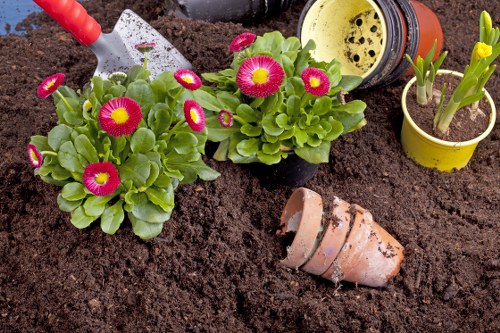
Maintaining a beautiful garden in Twickenham requires dedication, knowledge, and the right tools. Whether you're a seasoned gardener or a beginner, understanding the unique climate and soil conditions of Twickenham can help your garden thrive year-round. This guide provides comprehensive insights into effective garden maintenance strategies tailored specifically for the Twickenham area.
Twickenham's climate is characterized by mild winters and warm summers, making it suitable for a wide variety of plants. However, to ensure your garden remains healthy and vibrant, it's essential to adopt seasonal maintenance practices. From soil preparation to pest control, each aspect plays a crucial role in the overall health of your garden.
One of the first steps in garden maintenance is assessing the soil quality. Twickenham soils can vary, so conducting a soil test will help determine the necessary amendments. Adding organic matter such as compost can improve soil structure, enhance drainage, and provide essential nutrients to your plants.
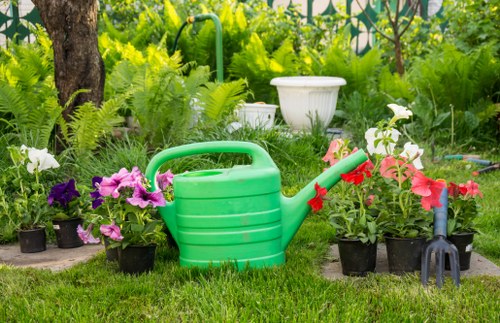
Seasonal Gardening Tips
Adapting your gardening practices to the seasons is vital for sustained plant health. In the spring, focus on planting new shrubs and perennials, as well as preparing flower beds. Regular watering and mulching can help retain soil moisture and suppress weeds.
Summer maintenance involves consistent watering, especially during dry spells. Pruning overgrown plants and deadheading flowers will encourage continuous blooming. It's also the time to manage pests and diseases that may arise due to the warm weather.
Autumn is ideal for planting bulbs for spring bloom and preparing the garden for the colder months. Clearing fallen leaves and debris helps prevent fungal diseases and pests from taking hold. Applying a layer of mulch can also protect plant roots from frost.
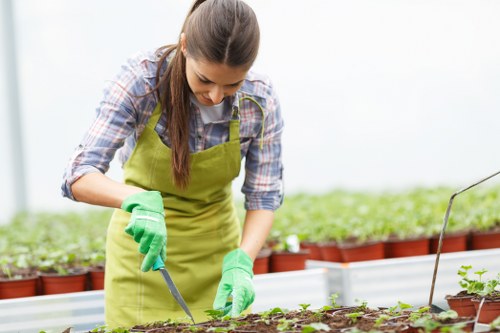
Essential Garden Tools
Having the right tools is essential for efficient garden maintenance. Basic tools include a sturdy shovel, pruning shears, a garden fork, and a hose or watering can. Investing in quality tools can make gardening tasks easier and more enjoyable.
- Shovel: Required for digging, planting, and soil aeration.
- Pruning Shears: Essential for trimming plants and removing dead growth.
- Garden Fork: Useful for turning soil and incorporating organic matter.
- Hose/Watering Can: Necessary for sustaining plant hydration.
Additionally, protective gear such as gloves and knee pads can enhance comfort and safety while working in the garden. Regular maintenance of your tools, including cleaning and sharpening, will prolong their lifespan and effectiveness.
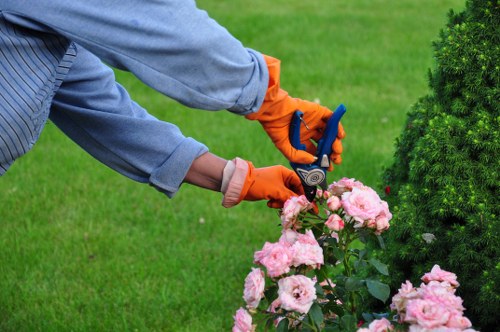
Pest and Disease Management
Protecting your garden from pests and diseases is crucial for maintaining plant health. Integrated Pest Management (IPM) strategies focus on preventing pest issues through cultural, biological, and mechanical methods before resorting to chemical controls.
- Cultural Control: Rotate crops and choose pest-resistant plant varieties.
- Biological Control: Introduce beneficial insects that prey on common garden pests.
- Mechanical Control: Use barriers like nets or traps to physically remove pests.
- Chemical Control: Apply pesticides as a last resort, ensuring they are environmentally friendly.
Regular monitoring of your plants will help identify issues early, allowing for timely interventions. Maintaining plant diversity can also reduce the likelihood of widespread pest infestations.
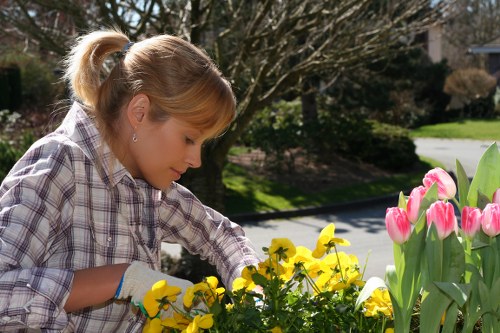
Watering and Irrigation
Efficient watering practices are essential for garden maintenance in Twickenham. Overwatering can lead to root rot and other plant diseases, while underwatering can stress plants and reduce growth.
Implementing an irrigation system, such as drip irrigation or soaker hoses, can provide consistent moisture directly to the plant roots, minimizing water wastage. Mulching around plants also helps retain soil moisture and regulate temperature.
Rainwater Harvesting
Collecting rainwater is an eco-friendly way to water your garden. Installing rain barrels can help conserve water and reduce your utility bills. Ensure that your rainwater harvesting system is properly maintained to prevent contamination and ensure the quality of water used for your plants.
Tips for Effective Watering
- Water early in the morning to reduce evaporation.
- Avoid wetting the foliage to prevent fungal diseases.
- Adjust watering schedules based on seasonal weather patterns.

Soil Health and Fertilization
Healthy soil is the foundation of a thriving garden. Regularly testing soil pH and nutrient levels can inform your fertilization strategy. Twickenham gardens benefit from a balanced fertilizer regimen that supports various plant needs.
Organic fertilizers, such as compost and well-rotted manure, improve soil fertility and structure. They release nutrients slowly, providing sustained nourishment to plants. Inorganic fertilizers can be used to address specific nutrient deficiencies as identified by soil tests.
Composting
Composting kitchen scraps and garden waste creates rich humus that enhances soil quality. A well-maintained compost pile recycles organic matter and reduces the need for chemical fertilizers. Incorporate compost into your garden beds to promote healthy plant growth.
Green Manure
Growing cover crops or green manure during off-seasons can protect soil from erosion, fix nitrogen, and add organic matter. These practices contribute to long-term soil sustainability and fertility.

Pruning and Trimming
Regular pruning and trimming are essential for maintaining the shape, health, and productivity of your plants. Proper pruning techniques prevent disease, encourage robust growth, and enhance the aesthetic appeal of your garden.
Different plants require specific pruning methods. For instance, flowering shrubs may need pruning after blooming, while fruit trees benefit from annual structural pruning. Understanding the growth patterns of your plants will guide effective trimming practices.
Tools and Techniques
- Use clean, sharp pruning shears to make precise cuts.
- Remove dead or diseased branches promptly.
- Prune to improve air circulation and light penetration.
- Follow species-specific guidelines to avoid damaging plants.
Advanced Pruning
Advanced pruning techniques, such as coppicing or espaliering, can maximize space and enhance the productivity of your garden. These methods require careful planning and execution but can yield significant benefits in the long run.

Lawn Care
A well-maintained lawn is the centerpiece of many Twickenham gardens. Effective lawn care involves regular mowing, aeration, fertilization, and pest control to keep the grass healthy and vibrant.
Mowing Tips
Maintain your lawn by mowing at the recommended height for your grass type. Avoid cutting more than one-third of the grass blade at a time to prevent stress. Sharpen mower blades regularly to ensure clean cuts and reduce the risk of disease.
Aeration and Overseeding
Annual aeration helps alleviate soil compaction, allowing roots to access water and nutrients more effectively. Overseeding can fill in bare spots and improve the density of your lawn, enhancing its overall appearance.
- Schedule aeration during the growing season.
- Select grass seed varieties suitable for Twickenham's climate.
- Water newly seeded areas regularly to promote germination.

Garden Design and Layout
An organized garden design enhances both functionality and aesthetics. Planning the layout involves selecting plant varieties, determining planting zones, and creating pathways and borders that complement the natural landscape.
Choosing Plants
Select plants that are well-suited to Twickenham's climate and soil conditions. Incorporate a mix of perennials, annuals, shrubs, and trees to create a diverse and resilient garden ecosystem.
Plant Placement
Arrange plants based on their sunlight and water requirements. Grouping plants with similar needs together simplifies maintenance and promotes healthier growth.
Creating Focal Points
Establishing focal points, such as a water feature, statue, or a particularly striking plant, can add visual interest and guide the flow of garden traffic.

Sustainable Gardening Practices
Embracing sustainable gardening practices not only benefits the environment but also contributes to the long-term health of your garden. Techniques such as composting, rainwater harvesting, and the use of native plants reduce resource consumption and promote ecological balance.
Native Plants
Incorporating native plant species supports local wildlife and requires less maintenance, as they are adapted to the regional climate and soil conditions. Native plants often require fewer fertilizers and pesticides, making them a sustainable choice for Twickenham gardens.
Organic Gardening
Adopting organic gardening methods minimizes the use of synthetic chemicals, fostering a healthier garden ecosystem. Practices like crop rotation, companion planting, and natural pest control enhance soil fertility and plant resilience.
- Reduce chemical pesticide use.
- Enhance biodiversity.
- Promote natural soil health.
Energy-Efficient Practices
Implementing energy-efficient practices, such as using solar-powered garden lights or manual tools, can further reduce your garden's environmental footprint.

Garden Maintenance Schedule
Creating a maintenance schedule ensures that all aspects of your garden receive the attention they need throughout the year. A well-structured plan prevents neglect and helps prioritize tasks based on seasonal requirements.
Monthly Tasks
- January - March: Plan garden layout, prune dormant trees, and prepare soil for spring planting.
- April - June: Plant spring flowers, start regular watering, and set up garden beds.
- July - September: Maintain irrigation systems, mulch garden beds, and manage summer pests.
- October - December: Clean up fallen leaves, plant winter bulbs, and protect sensitive plants from frost.
Annual Review
At the end of each gardening season, review your maintenance schedule and make adjustments based on what worked well and what didn't. This continuous improvement approach ensures your garden remains healthy and beautiful year after year.
Using Technology
Leverage gardening apps and software to track tasks, set reminders, and monitor plant health. Technology can enhance your gardening efficiency and help you stay organized.

Professional Garden Maintenance Services
While DIY garden maintenance can be rewarding, hiring professional services can provide expertise and save time. Professional garden maintenance in Twickenham offers a range of services, including landscaping, regular upkeep, and specialized care for unique plant species.
Benefits of Hiring Professionals
- Expert knowledge of local plant species and climate conditions.
- Access to specialized tools and equipment.
- Time-saving, allowing you to enjoy your garden without the hassle.
- Customized maintenance plans tailored to your garden's needs.
Choosing the Right Service
When selecting a garden maintenance service, consider their experience, portfolio, and customer reviews. Ensure they offer the specific services you require and can accommodate your garden's unique characteristics.
Maintenance Packages
Many professionals offer customizable maintenance packages that include regular visits, seasonal clean-ups, and emergency services. Choose a package that aligns with your garden's maintenance needs and your personal preferences.

Landscaping Enhancements
Enhancing your garden with thoughtful landscaping can transform it into a serene and functional outdoor space. Features such as patios, pergolas, and water features add value and appeal to your Twickenham garden.
Patio Design
A well-designed patio provides a perfect area for outdoor entertaining and relaxation. Choose materials that complement your garden's aesthetics and ensure durability against Twickenham's weather conditions.
Water Features
Incorporating water features like fountains or ponds can introduce a calming ambiance and attract wildlife. Proper maintenance ensures that these features remain clean and functional throughout the year.
Lighting Solutions
Strategic lighting enhances the beauty of your garden at night and improves safety. Consider solar-powered lights for an eco-friendly option.
- Choose energy-efficient lighting fixtures.
- Highlight focal points and pathways.
- Use timers and sensors for convenience.

Maintaining Garden Health
Ongoing maintenance is key to ensuring your garden remains healthy and lush. Regular inspections, timely interventions, and preventive measures contribute to the longevity and beauty of your garden.
Weeding and Mulching
Regular weeding prevents competition for nutrients and water, allowing your plants to thrive. Mulching not only suppresses weeds but also retains soil moisture and regulates temperature.
Fertilization Routine
Establish a consistent fertilization schedule based on your soil test results. Over-fertilizing can harm plants, while under-fertilizing can lead to nutrient deficiencies.
Integrated Pest Management
Adopt an integrated approach to pest management, combining biological, cultural, and mechanical methods to minimize pest impact without relying heavily on chemicals.

Conclusion
Effective garden maintenance in Twickenham involves a blend of knowledge, regular care, and strategic planning. By understanding the local climate, selecting appropriate plants, and adopting sustainable practices, you can cultivate a garden that not only looks stunning but also supports a healthy ecosystem.
Whether you choose to maintain your garden yourself or enlist the help of professionals, prioritizing garden maintenance will ensure your outdoor space remains a source of pride and enjoyment for years to come.
Contact us today to learn more about our garden maintenance services in Twickenham and take the first step towards a flourishing garden.

